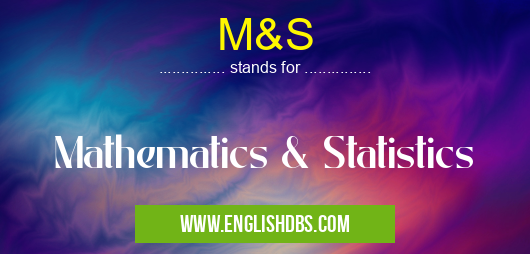What does M&S mean in MATHEMATICS
##

M&S meaning in Mathematics in Academic & Science
M&S mostly used in an acronym Mathematics in Category Academic & Science that means Mathematics & Statistics
Shorthand: M&S,
Full Form: Mathematics & Statistics
For more information of "Mathematics & Statistics", see the section below.
Mathematics & Statistics (M&S) is a wide-reaching field that explores the quantification and analysis of data. The mathematics and statistics combine to develop models, propose theories, and make predictions about the physical world. In science, M&S plays an important role in making sense of data, verifying theories while identifying patterns to explain phenomena that were previously unclear. By using their skills and knowledge gained from mathematical and statistical methods, practitioners can create solutions for problems encountered in a variety of scientific disciplines such as biomedical engineering, artificial intelligence, and robotics. M&S also have applications in fields such as data science, economics, finance, accounting, manufacturing, transportation systems, and much more.
Essential Questions and Answers on Mathematics & Statistics in "SCIENCE»MATH"
What is the difference between Mathematics and Statistics?
Mathematics is a field of study that involves the use of abstract concepts to explore the relationships between numbers, shapes, and other forms of data. Statistics is an applied field which uses mathematical methods to analyze quantitative data from experiments or survey results.
What are the applications of Mathematics and Statistics?
Mathematics is used in a wide range of fields, from engineering, computer science, physics, chemistry, biology to economics, finance and more. The use of statistics can be seen across most fields as well; for instance in medicine for analyzing patient data or performing medical research; in finance for making investment decisions; and in sports analytics to inform techniques for improving performance.
Who should study Mathematics and Statistics?
Both mathematics and statistics play important roles across many fields and so anyone who wishes to pursue a career in any number of areas could benefit from studying these disciplines. They also have useful applications beyond work-related purposes such as helping with decision making or providing insights into complex problems, so they can be beneficial to anyone interested in developing their analytical skills.
What kind of jobs require knowledge in both Mathematics and Statistics?
A vast range of roles may require applicants to have experience or expertise in mathematics and/or statistics including actuaries, astronomers, engineers (e.g., civil, electrical), biomedical scientists (e.g., pharmacists), data scientists / analysts / architects / engineers, financial advisors/planners/analysts; market researchers; mathematicians (pure or applied); statisticians; meteorologists; software developers; systems analysts & administrators).
What qualifications do I need if I want to become a professional statistician?
To become a professional statistician you will likely need relevant qualifications such as a Bachelor's degree (minimum) which includes components related to both mathematics and statistics - this could include degrees such as mathematics with statistics, applied mathematics & computing etc - although more specific qualifications such as Masters’ degrees are often preferred by employers. Many statisticians are also required to hold certifications such as those issued by the American Statistical Association (ASA).
How can I learn Mathematics and Statistics online?
There are numerous online courses available related to both mathematics and statistics covering topics ranging from basic arithmetic through advanced calculus or complex statistical techniques like machine learning algorithms. Many universities offer free online resources such as lecture notes on their websites while others provide courses with full certification available through paid packages offered by third parties like Coursera or EdX.
What skills do I need for studying Mathematics and Statistics?
To succeed when studying mathematics or statistics it is important that you possess strong problem solving capabilities along with excellent numeracy skills, critical thinking abilities along with solid understanding of algebraic principles like equations & linear inequalities along with being able to interpret graphical data accurately.
What kind of research projects can I undertake while studying Mathematics & Statistics?
Research projects related to these disciplines can cover diverse topics depending on your interests but might include graph theory applications in networks sciences; financial risk analysis using probability theory or statistical modeling methods; computer engineering applying numerical analysis techniques etc.
Final Words:
##In conclusion M&S stands for Mathematics & Statistics which has been developed over time so scientists can utilise its abilities for gaining insight while attempting to understand our universe more fully. Its various disciplines help us form predictions on phenomena which may be otherwise difficult without its assistance whilst aided by its many functions like quantitative research or exploration we could not achieve these goals before now.
